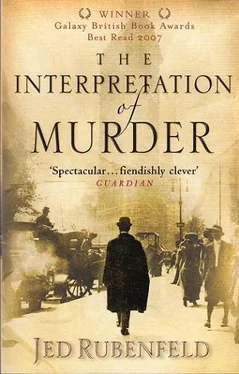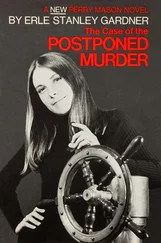Jed Rubenfeld - The Interpretation of Murder
Здесь есть возможность читать онлайн «Jed Rubenfeld - The Interpretation of Murder» весь текст электронной книги совершенно бесплатно (целиком полную версию без сокращений). В некоторых случаях можно слушать аудио, скачать через торрент в формате fb2 и присутствует краткое содержание. Жанр: Исторические приключения, на английском языке. Описание произведения, (предисловие) а так же отзывы посетителей доступны на портале библиотеки ЛибКат.
- Название:The Interpretation of Murder
- Автор:
- Жанр:
- Год:неизвестен
- ISBN:нет данных
- Рейтинг книги:5 / 5. Голосов: 1
-
Избранное:Добавить в избранное
- Отзывы:
-
Ваша оценка:
- 100
- 1
- 2
- 3
- 4
- 5
The Interpretation of Murder: краткое содержание, описание и аннотация
Предлагаем к чтению аннотацию, описание, краткое содержание или предисловие (зависит от того, что написал сам автор книги «The Interpretation of Murder»). Если вы не нашли необходимую информацию о книге — напишите в комментариях, мы постараемся отыскать её.
The Interpretation of Murder — читать онлайн бесплатно полную книгу (весь текст) целиком
Ниже представлен текст книги, разбитый по страницам. Система сохранения места последней прочитанной страницы, позволяет с удобством читать онлайн бесплатно книгу «The Interpretation of Murder», без необходимости каждый раз заново искать на чём Вы остановились. Поставьте закладку, и сможете в любой момент перейти на страницу, на которой закончили чтение.
Интервал:
Закладка:
'Been watching me all this time, have you, Seamus?' asked the man.
'Never in life, sir. I was sleeping all the while,' said Malley, who shivered like a man who had been sleeping in a cold, damp place.
The man in black tie doubted this assertion very much, although it happened to be true. But true or not, it made no difference, because Malley had seen him now. 'Shame on me, Seamus,' he said, 'if I'm the man to fire you for such a thing. Don't you know my mother, God rest her soul, was Irish?'
'I didn't know it, sir.'
'Why, didn't she take me by the hand thirty years ago to see Parnell himself come off the ship, practically right above our heads, where we're standing at this moment?'
'You're a lucky man, sir,' Malley answered.
'I'll tell you what you need, Seamus, and that's a fifth of good Irish whiskey to keep you company down here, which I happen to have in my car. Why don't you come up with me and I'll give it to you, provided you share a drop first. Then you can come back and make yourself comfortable.'
'You're too good, sir, too good,' said Malley.
'Oh, stop your gabbing and come on then.' Ushering Malley up the ramp to the elevator, the man in black tie pulled the lever to begin their ascent. 'I'll be needing to charge you rent, don't you know It's only fair.'
'Why, I'd pay anything at all for the view alone,' replied Malley. 'We're going to miss the first holding stage, sir. You need to stop.'
'Not a bit of it,' said the taller man. 'You're coming straight back down in five minutes, Seamus. No need to stop if you go straight back down.'
'Is that it, sir?'
'That's it. It's all in the tables.' And the man in black tie actually pulled a copy of the decompression tables from his vest, waving them before Malley It was quite true: a man in the caisson could make a quick trip up and down without illness, provided he spent no more than a few minutes on the surface. 'All right: ready to hold your breath?'
'My breath?' Malley asked.
The man in black tie yanked down the elevator brake, jerking the cabin to a sudden stop. 'What are you thinking, man?' he cried. 'We're going straight up, I tell you. You've got to hold your breath from here clear to the top. You want to die of the bends?' They were about a third of the way up the shaft, some sixty-five feet below the surface. 'How long have you been down, fifteen hours?'
'Closer on to twenty, sir.'
'Twenty hours down, Seamus — you'd be paralyzed for sure, if you lived at all. I'll tell you what it is. You take a deep breath, like me, and you hold it for dear life. Don't let go. You'll feel a little pressure, but don't let go, no matter what. Are you ready?'
Malley nodded. The two men each swallowed an immense lungful of air. Then the man in black tie started the elevator once more. As they rose, Malley felt an increasing burden in his chest. The man in black tie felt no such pressure, because he was only pretending to hold his breath. In actuality, he was steadily but invisibly exhaling as the elevator made its way to the surface. Over the throbbing din of the steam engines, the sound of his breath escaping could not be heard.
Malley's chest began to ache. To indicate his discomfort, and his difficulty keeping in his breath, he pointed at his chest and mouth. The man in black tie shook his head and waved his forefinger, emphasizing how important it was that Malley not exhale. He beckoned Malley toward him, put his large hand over Malley's mouth and nose, closing off those passageways completely. He raised his eyebrows as if to ask Malley whether that was better. Malley nodded, grimacing. His face turned redder, his eyes began to bulge, and just as the elevator reached its terminus, he coughed involuntarily into the hand of the man with black tie. That hand was now covered with blood.
The human lung is surprisingly inelastic. It cannot stretch. At sixty-five feet below the earth's surface, when Malley took his last breath, the ambient pressure is approximately three atmospheres, which means that Malley took into his lungs three times the normal quantity of air. As the elevator ascended, this air expanded. His lungs quickly inflated beyond their capacity, like overstretched balloons. Soon the pleura in Malley's lungs — the tiny sacs that hold the air — began to burst, rapid-fire, one after the other. The released air invaded his pleural cavity — the space between chest and lung — causing a condition called pneumothorax, in which one of his lungs collapsed.
'Seamus, Seamus, you didn't exhale, did you?' They had reached the top, but the man in black tie made no move to open the elevator door.
'I swear I didn't,' Malley gasped. 'Mother of God. What's wrong with me?'
'You've lost a lung, is all,' replied the taller man. 'That won't kill you.'
'I need' — Malley collapsed to his knees — 'to lie down.'
'Lie down? No, man: we have to keep you standing, do you hear me?' The taller man seized Malley under the shoulders, hauled him upright, and propped him against the elevator wall. 'That's better.'
Like most gases trapped in a liquid, air bubbles in a man's bloodstream rise straight upward. Keeping Malley vertical ensured that the air bubbles still in Malley's lungs, forcing their way through his ruptured pleural capillaries, would proceed directly to his heart and from there to his coronary and carotid arteries.
'Thanks,' whispered Malley. 'Will I be all right?'
'We'll know any minute now,' said the man.
Malley gripped his head, which began to swim. The veins in his cheeks were showing blue. 'What's happening to me?' he asked.
'Well, I'd say you're having a stroke, Seamus.'
'Am I going to die?'
'I'll be honest with you, man: if I took us straight back down, right now, all the way down, I might just save you.' This was true. Recompression was the only way to save a man dying from decompression. 'But do you know what it is?' The man in black tie took his time, cleaning the blood from his hand with a fresh handkerchief before finishing: 'My mother wasn't Irish.'
Malley s mouth opened as if to speak. He looked at the man who had killed him. Then his head jerked back, his eyes glazed over, and he moved no more. The man in black tie calmly opened the elevator door. No one was there. He returned to his car, found a bottle of whiskey in the back, and returned to the elevator, where he placed the bottle next to the slumped body. Poor Malley's corpse would be discovered in a few hours, to be mourned as yet another victim of the caisson. A good man, his friends would agree, but a fool to have been spending nights down there, in a place unfit for man or beast. Why, some wondered, had he tried to come out in the middle of the night, and how could he have forgotten to stop at the holding stages? Must have been spooked as well as drunk. On the pier, no one would notice the red clay footprints left by the murderer. All the caisson men tracked the same stuff, and the outlines of the man's elegant shoes were soon obliterated by the random treading of a thousand heavy boots.
Part 3
Chapter Eleven
I woke at six on Wednesday morning. I hadn't dreamt of Nora Acton — so far as I knew — but as I opened my eyes in the wainscoted white box of my hotel room, I was thinking of her all the same. Could sexual desire for her father really underlie Miss Acton's symptoms? That was plainly the thrust of Freud's thinking. I didn't want to believe it; the thought repulsed me.
I never liked Oedipus. I didn't like the play, I didn't like the man, and I didn't like Freud's eponymous theory. It was the one piece of psychoanalysis I never embraced. That we have an unconscious mental life, that we are constantly suppressing forbidden sexual desires and the aggressions that arise in their wake, that these suppressed wishes manifest themselves in our dreams, our slips of the tongue, our neuroses — all this I believed. But that men want sex with their mothers, and girls with their fathers — this I did not accept. Freud would say, of course, that my skepticism was 'resistance.' He would say I did not want the Oedipus theory to be true. No doubt that was so. But resistance, whatever else it is, surely does not prove the truth of the idea resisted.
Читать дальшеИнтервал:
Закладка:
Похожие книги на «The Interpretation of Murder»
Представляем Вашему вниманию похожие книги на «The Interpretation of Murder» списком для выбора. Мы отобрали схожую по названию и смыслу литературу в надежде предоставить читателям больше вариантов отыскать новые, интересные, ещё непрочитанные произведения.
Обсуждение, отзывы о книге «The Interpretation of Murder» и просто собственные мнения читателей. Оставьте ваши комментарии, напишите, что Вы думаете о произведении, его смысле или главных героях. Укажите что конкретно понравилось, а что нет, и почему Вы так считаете.












